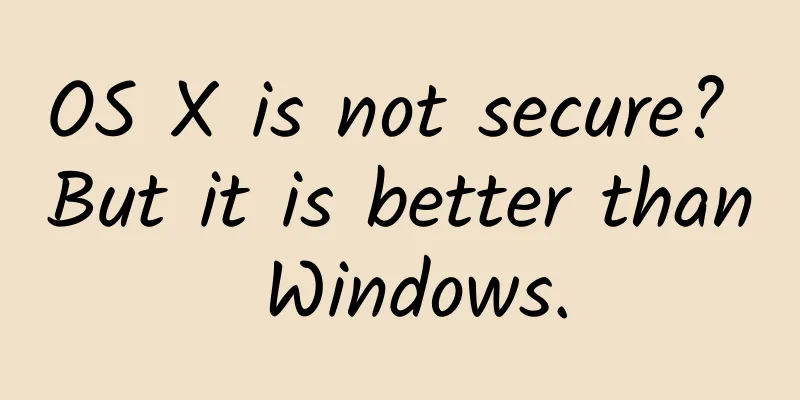OS X is not secure? But it is better than Windows.

|
Apple's OS X desktop operating system has always been known for its high security, but as its market share continues to increase, its security has declined. Currently, Apple's market share in the desktop computer market is close to 17%, and the OS X operating system is becoming more and more popular among ordinary and corporate users. But at the same time, hackers are also becoming more interested in it. According to a report recently released by security companies Bit9 + Carbon Black, they found 948 different malware samples on the OS X platform this year, while the total number in the first five years was only 180. But it is reassuring to know that this malware is not complex and can be easily removed. Specifically, half of the malware discovered this year was designed to force users to watch ads, which is what we are familiar with as malicious adware. In addition, the main reason for the system to be infected with these malware is the user's careless actions, such as downloading software that is identified as suspicious. Compared with the situation of Windows platform, OS X is still dwarfed. "Even if you add up all the malware in the history of OS X, it's still a drop in the bucket compared to the Windows platform," said Rich Mogull, an analyst at security firm Securiosis. Over the past few years, Apple has been beefing up the security of OS X. But there is no such thing as a wall that is impenetrable, and even a company as well-resourced as Apple still has exploitable vulnerabilities in its software. But at the same time, OS X has attracted some experienced security experts who are also working to protect the platform. Apple introduced a new defense feature in OS X El Capitan called System Integrity Protection (SIP) that makes it more difficult for malware to reach important system files. SIP can block the most powerful access rights in the operating system, that is, root. This permission is usually protected by only a password set by the Mac user. If the password is stolen, the attacker who obtains root privileges can disable other security protection features, thus posing a huge security risk. SIP can largely prevent malware authors from getting deep into the system. We also saw another interesting phenomenon related to OS X: 276 software vulnerabilities were disclosed on this platform this year, which is 4 times higher than the average of the past 15 years. According to security experts, malware authors seem to prefer to exploit software vulnerabilities to infect OS X. This year, there were three cases where malware or adware took advantage of disclosed vulnerabilities to enter the system. In the past, Mac malware and adware programs usually tricked users into installing them rather than exploiting vulnerabilities. Apple's built-in AV product XProtect will be located and updated to block nuisances such as malicious adware. However, Apple has now fixed more than 100 security vulnerabilities in El Capitan, which means hackers have more opportunities to infect OS X with malware. |
<<: What else can the "heartfelt" Ma Huateng give to Liu Qiangdong?
>>: Facebook's "Skynet Project" The Secret Behind Internet.org
Recommend
Understanding Code Obfuscation in Android
This article is a summary of my practice, introdu...
Postpartum repair and slim waist postpartum body shaping Muquan two classes with notes
Postpartum repair and slim waist, postpartum body ...
Creative advertising materials for the Meiyu Women’s Platform!
As women’s education and employment levels improv...
Recommended books for beginners of web front-end development, 105 excellent e-books on front-end development (Baidu Netdisk)
With the advent of the 5G era, the Internet has b...
Ten pictures, detailing how to do user segmentation?
A classmate asked: Our leader asked us to do user...
Collection of May 4th Youth Day poster copywriting!
Just finished May Day After finishing the activit...
Let’s go! Go to the Ice and Snow Kingdom to experience the “hard work” of technology
Zheng Yingzhuo, Science Times reporter Li Liyun, ...
What qualifications are required for Huizhou’s knowledge payment mini program? What are the features?
WeChat, as the largest traffic portal on mobile t...
A Tibet Airlines flight went off the runway and caught fire! What is the "black ten minutes"? How to respond to an airplane accident?
At about 8:00 on May 12, a Tibet Airlines flight ...
For information flow advertising sponsors with large budgets, what kind of material and copywriting can make them earn a fortune?
After reading this article, I hope you can improv...
15 lessons on financial management for women, teach you how to plan your household expenses from scratch and earn enough to buy a house at home
Her name is Wei Xiaowei, a mother of two who deal...
With counterfeiting scandals recurring, Japan's manufacturing halo is fading rapidly
The reason why Japan can become a developed count...
Can Gree replicate its mobile phone sales myth by “encircling Wei to save Zhao”?
Gree 's brand department should have exceeded...
The ninth episode of the Aiti Tribe live class: Technology or management, how should programmers plan their career path?
[51CTO.com original article] The career planning ...
James Webb Space Telescope turns 11: Why is it so amazing?
On December 14, 2022, Nature magazine named Jane ...









